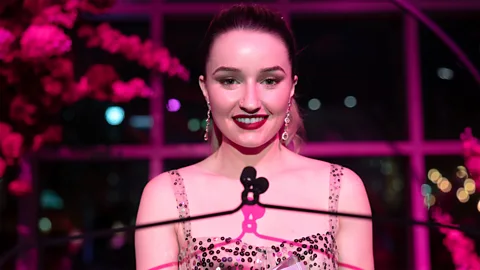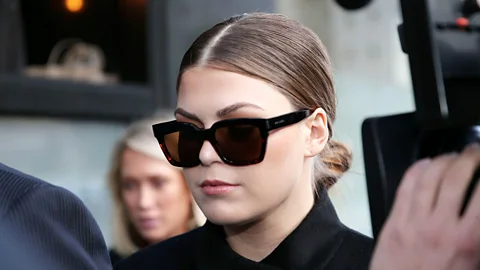Apple Cider Vinegar: How Instagram wellness guru Belle Gibson faked cancer – and caused a scandal
 Netflix
NetflixA new Netflix miniseries tells the story of an Australian influencer who lied about having a terminal illness to promote alternative therapies. A decade on, it remains a warning.
Back in 2013, a remarkable, against-all-odds story of survival hit the headlines when a young woman launched what would become a best-selling wellness app with advice on how she had beaten cancer. Just four years earlier in 2009, Australian blogger Belle Gibson, then aged 20, had, by her own account, been diagnosed with a "malignant brain cancer" and been given "six weeks, four months tops" to live. However, she claimed that she had chosen to withdraw from chemotherapy and radiotherapy treatment, and had instead embarked on "a quest to heal myself naturally… through nutrition, patience, determination and love".
Amassing 200,000 fans online on Instagram – then in its early days – who avidly followed her wellness journey, she then launched a best-selling wellness and nutrition app, followed by a cookbook, called The Whole Pantry, crediting her diet for curing her of her terminal illness, and inspiring others to follow her in "empowering myself to save my own life". She was dubbed "the most inspiring woman you've met this year" by Elle Australia, while in 2014, Cosmopolitan gave her a "Fun, Fearless Female" award.
 Alamy
AlamyHowever, it was all a lie. Gibson had never been diagnosed with a brain cancer, nor the "cancer in my blood, spleen, brain, uterus, and liver" that she subsequently claimed she had also been diagnosed with in a 2014 Instagram post, when rumblings first began to surface in Australian media that she may have been a fraud. Finally, in April 2015, she admitted the truth in an interview with Women's Weekly. "No, none of it's true," she said, but refusing to take further responsibility, she added, opaquely: "I am still jumping between what I think I know and what is reality. I have lived it and I'm not really there yet."
How her story is dramatised
This obfuscation of reality – and the mental gymnastics of Gibson's "explanations" for her actions – are the backbone of Apple Cider Vinegar, a glossy and poppy Netflix miniseries dramatisation of the whole scandal, released this week. Showrunner Samantha Strauss leans into Gibson's shaky relationship with truth in the way she tells the story. From the chaotic timeline, which jumps between characters and events from pre-2009 through to 2015, through to the way it blends reported facts with fictionalised sequences – a campy montage where the lead characters lip-sync along to Britney Spears' Toxic; the appearance of a doctor character who Gibson claims treated her, but has never been proven to exist – the miniseries makes it purposely difficult ever to be able to grasp what really happened. That being said, how could a show based on a pathological liar ever be played fully straight?
Notably following the fallout from Baby Reindeer last year – Netflix is being sued by a woman who claims she was identified from the series, which stated "This is a true story" at the beginning of every episode – Apple Cider Vinegar also caveats the drama with a slightly different disclaimer each episode, such as: "This is a true-ish story based on a lie," and, "The following is inspired by a true story. Certain characters and events have been created or fictionalised."
Playful with the truth as this fictionalisation might be, it certainly makes for a compelling – and shocking – yarn. Following in the well-trodden footsteps of other scammer TV dramas, Apple Cider Vinegar positions itself – both in style and subject – alongside the likes of fellow Netflix miniseries Inventing Anna, which focused on "fake heiress" Anna Delvey/Sorokin, convicted of attempted grand larceny and larceny in the second degree in 2019, and The Dropout (Hulu/Disney+), in which Amanda Seyfried played Elizabeth Holmes, the Silicon Valley fraudster who faked blood test diagnoses with her medi-tech company, Theranos, and in 2022 was convicted of four accounts of fraud; she is still serving her 11 years and three months sentence.
Like Sorokin and Holmes before her, Gibson – played with a charming, chilling duplicity by Dopesick's Kaitlyn Dever – is also depicted as embodying the endgame of hustle culture, where "fake it 'til you make it" ends up becoming a dangerous ideology, rather than a positive self-help mantra.
 Netflix
NetflixGibson was one of the first in a new breed of scammers who used social media and apps to dupe people – see also Simon Leviev, The Tinder Swindler, who conned women out of money on dating apps, and Hargobind Tahilramani, The Hollywood Con Queen, who exploited people working in Hollywood by pretending to be famous actors and directors. But even compared to these subsequent scam scandals, Gibson's fraud still remains a staggeringly cruel trick to pull; faking a terminal illness in online support groups to exploit vulnerable people in a way that accorded her commercial profit and fame.
"The thing you need to understand is Belle doesn't have friends, she has hosts," says the character of Gibson's manager Chanelle (Aisha Dee), who is based on her real life former friend, Chanelle McAuliffe. "If, and only if, she finds you to be valuable, she'll find a way to attach herself."
The damaging impact that Gibson's lies had is highlighted by the juxtaposed stories of two other women in the series. Milla Blake (played by Alycia Debnam-Carey) is a 22-year-old journalist who finds out she has epithelioid sarcoma, and blogs about her illness. She is based on the real-life Jessica Ainscough, who rose to internet fame at a similar time as Gibson with her website, Wellness Warrior, in which she documented her struggle with being diagnosed with the same cancer. Ainscough, too, promoted the use of controversial alternative therapies, such as those proffered by the Gerson Institute in Mexico – which offers a treatment that claims to activate "the body's extraordinary ability to heal itself through an organic, plant-based diet, raw juices, coffee enemas and natural supplements". However, she later died from cancer, aged 30.
In the series, Gibson becomes fixated on Blake, first becoming part of her online community, then borrowing not just her experiences of cancer, but her tone of voice and phrases, in creating her own social media persona. Like Blake, Gibson purports to be a trustful, loving and honest friend to her followers, giving life advice and heavily advocating for alternative treatments for illnesses. (For the curious – the title Apple Cider Vinegar comes from an anecdote Gibson told in which she drank the liquid and claimed to have rid herself of a tapeworm from her mouth.) Both girls are shown bleakly competing to become social media's favourite cancer-fighting influencer.
A third character, Lucy (Tilda Cobham-Hervey), is fictional, but an important person to weave into the story nevertheless; she represents an unquantifiable number of Gibson's followers who were actually diagnosed with cancer, and may have been influenced to stop conventional, medically-approved treatments in favour of combating their illness with her suggestions of, among other things, eating organic vegetables, and trying Ayurvedic medicine, oxygen therapy and craniosacral therapy. It's easy to see how the wholesome, picture-perfect world of flower crowns and sisterhood wellness retreats posted on social media would be an alluring and comforting safe space for those in need, but the series whips away these carefully constructed images to show the sickness of the reality beneath.
As detailed in the series, Gibson's exposure came at the hands of two investigative journalists at Melbourne newspaper The Age, Beau Donelly and Nick Toscano, who co-authored the 2017 book that the series is based on, The Woman Who Fooled the World. In early 2015, they uncovered that only an estimated A$7000 (£3,500) of A$300,000 (£150,000) that Gibson had claimed to have given to a number of charities had been paid. Once these financial irregularities came out, suspicions then arose about the conflicting stories around her health, and after her Women's Weekly confessional interview, she took part in another baffling TV tell-all interview on 60 Minutes Australia in June 2015. In this, she once again admitted to her deception to some extent, but also claimed to be the victim, saying she had been "duped" and "been taken for a ride" by the aforementioned, never-seen quack doctor, apparently called "Mark Johns", yet another time "Dr Phil".
 Netflix
NetflixIn the show's exploration of the pull of what Gibson and other fraudulent health and spirituality gurus offer, the character of Gibson's LA crisis management PR, Hek (Phoenix Raei) gets to the core of it. "Is that not a little bit magic?" he asks. "Drink a little bit of this stuff and you're all cleansed? Pure again. How hopeful is that? I'd pay anything just to feel a little bit better, a balm to take the edge off, a way to soothe this... tragedy of being human."
Likely to amass a big Netflix viewership, Apple Cider Vinegar should also be an alarm bell for anyone still blindly taking medical advice from influencers with no medical qualifications but a large online following. The global wellness industry was worth $6.3 trillion in 2023, but it continues to contain darker elements, with cases of people manipulating and hurting those seeking holistic therapies. Only recently, in December, Hongchi Xiao, an alternative healer, was convicted of manslaughter after a 71-year-old diabetic woman stopped taking her insulin while on a retreat he was running; and in 2024, the Brazilian wellness influencer Kat Torres was found guilty in 2024 of human trafficking and slavery.
What happened next?
In another defiance of narrative convention, Apple Cider Vinegar subverts the "what happened next?" postscript that you typically get at the end of a true-story dramatisation. As the familiar text begins to scroll across the screen ("In 2017, the Federal Court of Australia found Belle Gibson guilty of misleading and…"), Dever's Gibson interrupts and tells the viewers: "You know what? You can Google it". Go on, she chides the audience, go and get your information from the internet – but, of course, isn't that precisely where all this trouble started?
As apt as this sleight of hand is, it also feels like a bit of a cop-out, allowing the full extent of Gibson's crimes to go unexamined. In March 2017, as reported by the BBC, Gibson was found guilty of five breaches of consumer law, and in September that year, she was ordered by the federal court in Melbourne to repay A$410,000 (£205,000) to the state of Victoria for her false charity promises. However The Guardian reported in 2021 that her house had been raided again, due to the still unpaid fines, which they said now amounted to more than A$500,000 (£250,000).
Neither Apple Cider Vinegar, nor her previous two tell-all interviews get to the bottom of why Gibson carried out her elaborate hoax. Was it because of a troubled childhood, as she claimed, where she ran away from home aged 12? Was it for fame and attention, or was the whole charade purely a money-making scheme?
Some might attribute Gibson's knowingly false claims to Munchausen syndrome (a condition also called factitious disorder, and defined as people claiming to be ill to "receive some form of psychological validation, such as attention, sympathy, or physical care"). In a 2015 article for the Guardian, neurologist Jules Montague wrote: "Factitious disorders and malingering can overlap. External incentives might not drive the initial behaviour but can follow thereafter. Gibson might have initially enjoyed playing the sick role. But she didn't turn away the money that flowed afterwards."
 Netflix
NetflixIn 2000, Doctor Marc Feldman came up with the more specific term Munchausen by internet (MBI). MBI is now defined by the NHS as "where a person joins an internet support group for people with a serious health condition, and then claims to have the illness themselves", which perhaps might be more applicable to Gibson. As to whether she's a fantasist, or more a "master manipulator of the truth", as Tara Brown, the 60 Minutes interviewer called her, there are always questions over whether people who display signs of Munchausen syndrome or MBI are patients or perpetrators. Feldman told The Guardian in 2015: "Sometimes they are both, but in the Gibson case, the audacity of her ruses and the [alleged] misappropriation of monies may make the word 'perpetrator' more appropriate."
"There have always been snake-oil salespeople," journalist Toscano told The Guardian in 2017. "There have always been people like [Gibson]. But where this story differs is her explosion to success, and her incredible reach was made possible by a number of intensely modern forces."
Gibson's is a disturbing tale; a perfect storm involving internet culture at a time when it was still relatively naïve about scammers; a health and wellness community seeking to find the good in everyone; and a con artist who perhaps suffered with her own delusions. After all, how could she possibly have believed that the truth wouldn't come out in the end?
Netflix is keen to emphasise that Gibson has not been paid for her story and it's not known yet what she makes of it all. In fact, Gibson has rarely been seen in public since the scandal erupted. In 2020, she appeared in a video in Melboourne claiming to be part of the Omoro community, an Ethiopian ethnic group, and said that she was now called "Sabontu". She also claimed she wanted to raise funds for the community. In February 2024, a news reporter from Channel 9's A Current Affair confronted her at a petrol station, and asked why she hadn't paid her fine yet. "Have some humanity," she replied. "I haven't paid things because I can't afford to".
While Gibson remains one of the most notorious "wellness" scammers out there, she won't be the last. Shows like Apple Cider Vinegar are still a vital, necessary reminder that the internet is full of people with carefully constructed identities – both real and fake – and that the only really healthy course of action is to approach it all with a dose of scepticism.
Apple Cider Vinegar is available to stream now on Netflix from 6 February
--
If you liked this story, sign up for The Essential List newsletter – a handpicked selection of features, videos and can't-miss news, delivered to your inbox twice a week.
